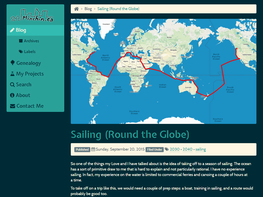Seafoam v2.9.1 released with even better support for microblogging! pypi.org/project/seafoam/2.9.1 #Seafoam #Releases #Python
Seafoam v2.9.0 released with support for microblogging! pypi.org/project/seafoam/2.9.0 #Seafoam #Releases #Python
Advanced Pelican: Self-Configuring Themes, and Seafoam 2.6.0 Released
I’ve just released a groundbreaking version of my website theme Seafoam; I believe this is the first Pelican theme designed to configure itself!
The root of this magic is that the theme has actually been packaged as a namespace plugin for Pelican. If you’re running a sufficiently recent version of Pelican (i.e. v4.5 or newer), Pelican will automatically load the Seafoam plugin; if you’re using an older version of Pelican (or other, non-namespace plugins), you’ll need to add the Seafoam plugin to you configuration:
• ~6 min to read • read more
Seafoam 2.5.0 Released
• ~3 min to read • read more
Seafoam 2.4.5 Released
• ~4 min to read • read more
Pelican Trove Classifiers Added to PyPI
• ~1 min to read • read more
Seafoam 2.0.4 Pelican Theme Released
Version 2.0.4 of Seafoam has been released.
Seafoam is the Pelican theme I use for this site, but published to PyPI in the hope that it will be useful to others.
This release changes the name of the project to seafoam from the unwieldy minchin.pelican.themes.minchindotca. It also add support for the Pelican Comment System, removes the need to define Jinja2 filters in your configuration file, updates to Font Awesome v4.7, and several design fixes as well. Code is updated to work with Pelican v3.7 and Jinja v2.9.
• ~2 min to read • read more
I Redesigned My Blog
• ~2 min to read • read more
Minchin dot CA Pelican Theme 1.1.0 Released
• ~2 min to read • read more
Minchin dot CA Pelican Theme 1.0.0 Released
pip. To that end,
I’ve packaged my website theme and uploaded it to PyPI.
• ~1 min to read • read more


